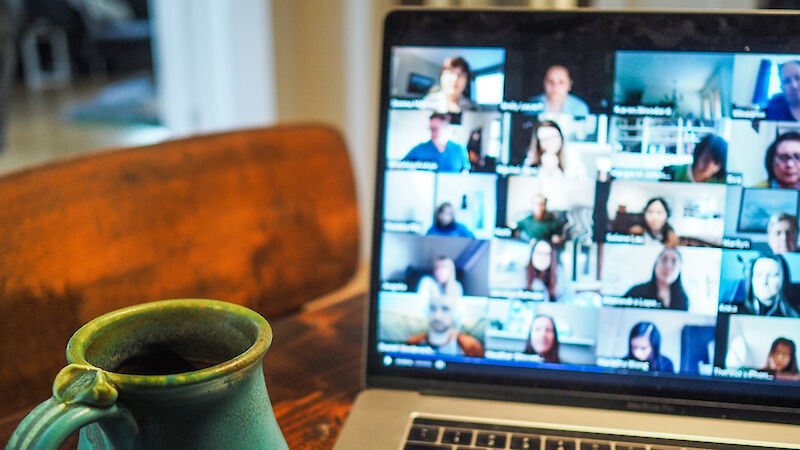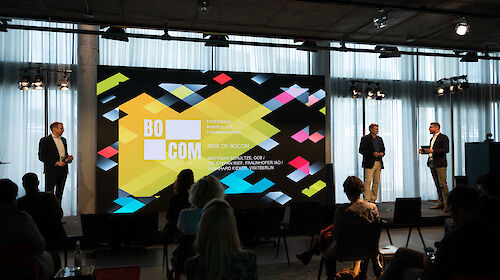Limited communication without physical contact or more space for diversity?
Thoughts on intercultural challenges for international conferences in times of the Corona pandemic
 © Chris Montgomery on Unsplash
© Chris Montgomery on Unsplash
"Among the things that will be remembered from this very strange year is the word 'physical'. It is currently used to mark something as special which until recently was taken for granted", says author Tilman Spreckelsen on the postponement or partial virtualisation of the Frankfurt Book Fair in 2020 (Frankfurter Allgemeine Zeitung, 8 July 2020, p. 11, own translation).
 © Chris Montgomery on Unsplash
© Chris Montgomery on Unsplash
Katrin Nissel
- Research Associate
- Center for Intercultural Management & Diversity (ZIM, HSB, City University of Applied Sciences Bremen)
As a research associate at the Center for Intercultural Management & Diversity (ZIM, HSB, City University of Applied Sciences Bremen) Katrin Nissel advances the dialogue between science, culture, education, politics and business. She develops concepts for teaching intercultural and diversity competence and organises events to "shape diversity". Her research focuses on different communication styles, teaching and learning beliefs, cultural theories in an international context. Furthermore she is interested in the link between knowledge, power and culture, as well as in diversity management as an organisational change process.
further information © Chris Montgomery on Unsplash
© Chris Montgomery on Unsplash
Katrin Nissel
- Research Associate
- Center for Intercultural Management & Diversity (ZIM, HSB, City University of Applied Sciences Bremen)
At the HSB Faculty of Economics she teaches "Intercultural Communication", "Diversity Management", "Cultural Studies of Brazil and Europe". She also coordinates academic exchange with Brazilian partner universities, companies, research and funding institutions. Katrin Nissel studied Portuguese Philology, German Studies and Philosophy (M.A.) in Hamburg, Lisbon and Rio de Janeiro. She taught as an assistant professor of the German Academic Exchange Service (DAAD) at the University of Belo Horizonte (UFMG, Brazil). Katrin Nissel also was responsible for concepts and cultural management of music and dance festivals which have the relation between Europe, South-America and Africa at heart. Both in everday and in professional situations she experiences again and again how enriching but also how challenging communication between different cultures can be.
International conferences and trade fairs thrive on the exchange of ideas, on the transfer of knowledge, on the diversity of perspectives, on the opportunity to gain insights into other 'worlds', on different styles of communication and presentation, on personal encounters.
Could we have imagined half a year ago that there would be a time when scientists, publishers, artists, event organizers from all over the world would no longer be able to travel from one place to another, when conferences, congresses, concerts would not take place at all or would be purely virtual, without the physical presence of the speakers and participants, without the presence of an audience? Probably not.
The novel "Changing Places" by the British author David Lodge (first published in 1975), captures a new era of transatlantic academic exchange, made possible in part by mass air travel, plays with stereotypes of the American and British education and university systems. In his follow-up novel "Small World", the academic conference circuit from Tokyo via Jerusalem to Honolulu becomes a prerequisite for setting the course in an academic career but also for interpersonal encounters. Both novels focus on travel, role reversal, chance encounters, which only later show their effect. All this was the reality of international exchange until March 2020.
What possible consequences do restrictions on travel and personal contacts have for communication, relationship building and networking at international events?
The opportunity for informal meetings at international congresses is appreciated worldwide. These moments are characterized by coincidences, such as discovering that you know a person equally well from several corners, the unforeseen, such as suddenly discovering a new research interest in a one-on-one conversation. In addition to the professional broadening of horizons, these events are also about intercultural encounters and understanding.
For me as a lecturer and researcher in the field of intercultural communication, international conferences also offer interesting insights into a cosmos in which it becomes clear what influences cultural imprints have on communication and lecture styles or on different expectations of hospitality, what importance is attached to breaks and informal exchange. At conferences, many cultural differences become apparent, which can be very enriching. By eliminating the physical encounter, all this tends to be hidden: Do I greet participants with a kiss, a hug or a handshake? Do I network better by making professional connections or by talking about personal interests, hobbies, family, life circumstances? And how are these different approaches perceived by my counterpart? When I'm at a congress in Brazil and speak mainly about my research during informal part, I can perhaps be considered arrogant and know-it-all. How important is 'small talk' to me, how important is focus? Some people cultivate a culture of lecture-reading, others a culture of entertainment or interaction. For some, hospitality, creating a community among researchers, meeting new people or reuniting with old acquaintances tends to be more important than the expertise of the speakers or the choice of topics.
Challenges for exchange and networking at virtual congresses
In times of the Corona pandemic, virtual congresses are held in many places due to restrictions on travel and personal contacts. Speakers and participants are visible (or not) in small 'tiles'. If a person is visible, the radius is usually limited to the face. Gestures are barely perceptible, facial expressions look different because you are looking into the camera. At the beginning of virtual congresses, in the phase of 'letting in', moments of uncertainty arise, which often make the moderator, speakers and participants seem helpless. During the breaks the faces usually disappear, if they were visible at all before. There is hardly any dialogue or exchange in small groups. The setting tempts to a rather low-context communication, to a communication that is very direct and explicit. How do people from high context communication cultures, who are used to read between the lines, to perceive the atmosphere, to interpret gestures and facial expressions, feel about this situation? What if, especially in international scientific exchange, the conditions are such that people tend to 'swear in' to a very objective style of communication that focuses on the essentials? What does this ultimately mean for exchange and networking, these important side effects of international conferences? We do not yet know the long-term consequences.
But which of these challenges could be opportunities for the digital transformation? Through virtual spaces, we might be able to make congresses even more international, diverse and inclusive, attract more people who cannot travel due to certain circumstances, disabilities, lack of financial means, etc., and encourage them to participate.
 ©
© ©
© ©
©